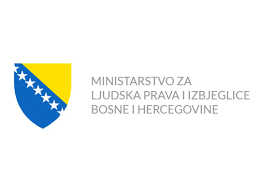
Support to the system of reception and integration of citizens of BiH returning under readmission agreements
Project details
Project period:
September 2020 - August 2022
Project implemented by:
Implementer:
- Ministry of Human Rights and Refugees of Bosnia and Herzegovina
Implementing partner:
- Hilfswerk International
Project partners:
- Hilfswerk International Representation Office Sarajevo
- Ministry of Human Rights and Refugees of BiH
Project financed by:
- German Federal Office for Migration and Refugees
Activity description
1. In several newly involved municipalities, 20 residential units have been renovated, equipped with basic furniture and devices
- Regional meeting with mayors/chiefs and local communities not involved in earlier stages of the project
- Appoint local readmission teams in selected local communities
- Making and sending letters of intent to rebuild residential units
- Mapping proposed residential units and assessing the current state of proposed housing units
- Preparation and implementation of tender procedure for the reconstruction of residential units
- Selection of contractors for reconstruction of residential units
- Monitoring of activities during reconstruction
- Drafting and adopting the Regulations for the Use of Residential Units
- Preparation of residential units for reconstruction (legal, technical, proprietary)
- Procurement of basic furniture/devices for all renovated residential units
- Handover of renovated residential units
2. Up to 300 readmised persons can be temporarily accommodated in the renovated residential units
- Establish operational management of temporary disposal reception capacities (monitoring of reception capacities, security, maintenance, cleaning, etc.), for smooth procedure.
- Establish a system of referral of readmised returnees entitled to temporary housing, to local communities with available accommodation capacities
- Temporary dispose of returnees for up to 6 months in renovated housing units
3. Local readmission teams established in 20 newly involved local communities, and in other local communities throughout BiH appointed commissioners for the issue of readmission
- Appointment of local readmission teams in local communities that have full inclusion status and commissioners who are contact points in other local communities, to provide direct advice and help readmised people in local communities
- Regional meetings with readmission teams and commissioners (coordination of project implementation activities, introduction to readmission procedures, roles and responsibilities of the state authorities involved)
- Training of local readmision teams to develop local action plans and projects
- Appointment of an IT equipment procurement team
- Select a vendor to purchase and deliver IT equipment
- Install a database and train local readmission teams about how to use it
- Procurement of a motor vehicle for the enhanced and more effective presence of representatives of the competent state institutions (in the first place of the ICTY), in local communities, with a view to improving mutual cooperation in the field of readmission
- Identification of NGos in order to develop an NGO support network in the process of integrating readmised persons
4. Local action plans for socio-economic integration of readmised persons available at the municipal level, which include all relevant local actors and focus on marginalised groups (such as Roma)
- Activating the coordination mechanism already established under the "Strategy for the reception and integration of bh citizens returning under the readmission agreement and the 2015-2018 Action Plan. years', which entails a clear definition of the roles and responsibilities of all institutions involved in the management of reintegration.
- Establishment of an interinstitutional working group on coordination and co-operation between key actors in the state reintegration system
- Establishing cooperation structures for the reception and accommodation of vulnerable persons (minor children, chronic patients or persons with disabilities) with the involvement of NGos
- Establishing close co-operation with Roma communities and Roma involvement projects, in particular Bosnia and Herzegovina's Action Plan to address Roma's problems inthe areas of employment, housing and health care (depending on selected municipalities)
5. Secured reception and targeted support for socio-economic integration, based on the individual needs of readmised returnees
- Analyze reintegration conditions in selected local communities
- Drafting readmission management models tailored to the capacities of institutions, institutions and organisations involved at all levels of inclusion
- Readmision teams for each readied returnee temporarily placed in a residential unit develop an individual reintegration plan in accordance with socio-economic, health and educational circumstances
6. Development of monitoring and evaluation systems in supporting the reintegration of readmised returnees and ensuring the sustainability of returns and reintegration systems
- Collection, preservation and forwarding of precise and systematised data on the socio-economic state of returnees and assessing their reintegration needs
- Training of relevant local actors in readmission programmes on fundraising and other financial resources (EU funds, state funds, funds of countries sending readied persons to BiH) to provide continuous assistance to returnees after the end of the project period
- Continuous adjustment, improvement and refinement of the cooperation and coordination mechanism between all institutions involved
- Developing an active employment policy to make readily competitive in the labour market, with a particular focus on encouraging marginalised persons and ethnic minorities (such as Roma) through training programmes or the application of special preferential treatment in filling vacancies.
7. Preventing visa-free abuse
- Workshop on drafting guidelines to prevent visa-free abuses
- Drafting an information campaign plan on the rights and obligations of travel within the visa-free regime and the risks of illegal migration
- Carrying out activities to raise awareness of the risks of illegal migration and disseminate extensive information on legal migration and opportunities for Germany/EU
- Select a service provider with campaign implementation capacity
- Monitoring the implementation of the information campaign
Project partners:


Project financed by:


